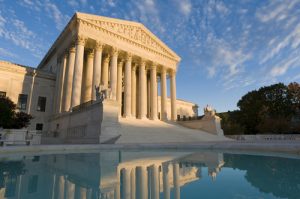
Elizabeth Slattery, a legal fellow at the Heritage Foundation, recently outlined key cases that the U.S. Supreme Court will hear after the next president appoints a new justice.
In an article published in the Ripon Forum, Slattery wrote that the sudden passing of Justice Antonin Scalia led to deadlocks and compromises in some of the term’s biggest cases, highlighting the importance of every seat.
“Whomever the next president selects as Scalia’s replacement will be crucial to either preserving or eroding our rights, given the fact that the court routinely hears cases involving just about every aspect of Americans’ lives,” Slattery wrote.
Slattery highlighted the importance of a number of cases, including Friedrichs v. California Teachers Union. In that case, which ended in a 4-4 tie, schoolteachers who opted out of union membership challenged a requirement that they subsidize collective bargaining costs.
“The teachers objected to being forced to pay for the union’s lobbying the state over teacher salaries and benefits, arguing that this violates their First Amendment free speech and associational rights,” Slattery wrote. “This case was seen as the best chance of reversing a bad precedent dating back to the 1970s that allowed the government to force employees to pay a ‘fair share’ for collective bargaining, even if they opted out of union membership. Scalia was considered a likely fifth vote for the teachers, but following his passing, the case ended in a 4-4 tie.”
Slattery also noted the importance of Zubik v. Burwell, a case in which religious organizations challenged the Affordable Care Act’s requirement that religiously-affiliated non-profits provide employees with health insurance that covers potentially life-ending drugs and devices.
“The court issued a short, unsigned opinion instructing the lower courts to reconsider these claims in light of the government’s belated admission that it could provide the mandated coverage without forcing the employers to violate their religious beliefs,” Slattery wrote. “While this was a victory for the Little Sisters and other challengers, the justices did not rule on the merits of their claims. It’s hard not to imagine the full-throated defense of religious freedom, like in Burwell v. Hobby Lobby (2014), the court might have issued had Scalia still been on the court.”
In Fisher v. University of Texas at Austin, meanwhile, Abigail Fischer sued the school after she was denied admission, arguing that she had been discriminated against because she was white.
“The case reached the Supreme Court twice, with four members of the court ruling this term that the school’s race-conscious admissions program does not violate the Fourteenth Amendment’s Equal Protection Clause,” Slattery wrote. “Justice Elena Kagan recused herself, so the case still may have ended up tied 4-4 had Scalia been on the court. It’s possible, however, that Scalia could have persuaded the author of the majority opinion, Justice Anthony Kennedy, to write a different sort of opinion. Kennedy’s opinion in Fisher II betrayed two-and-a-half decades of his own equal protection jurisprudence and gutted his prior opinion in the case, leaving many court watchers scratching their heads.”
Slattery also noted that two cases — Whole Woman’s Health v. Hellerstedt and United States v. Texas — would have a major impact on the safety and availability of abortion providers.
“These cases demonstrate the magnitude of issues the Supreme Court regularly considers each term,” Slattery wrote. “That’s why every justice matters, and why voters should consider what kind of justice the next president will put forward to replace Scalia. Another Obama justice likely would have ruled lockstep with the court’s liberal block, allowing the administration to violate the separation of powers and trample religious freedom; restricting states’ ability to ensure women’s safety comes before the abortion industry’s profits; limiting public employees’ speech and associational rights; and permitting race-based discrimination at our nation’s colleges.”



